 |
 |
 |

A Matter of Application
Members of the College Class of 2005 share excerpts from their application
essays-their high school efforts to capture who they were at that moment in
their lives-and reflect a little on their freshman year.
The essay question.
Nothing induces test anxiety in high school students quite like the open-ended
request to "Tell us about yourself." And when it comes to writing
an essay that will accompany an application to college, the anxiety for students-usually
high school juniors-can be enough to make most long for the simple pressures
of a spot form.
At least one recent national study indicates that high school students devote,
on average, 10 hours to their college application essays.
So how important is the essay?
"The essay is an opportunity for students to display their enthusiasm,
describe their interests, and show us their personality in a way that doesn't
often come through in test scores or grade reports," says W. Jamie Hobba,
director of admissions at Rochester.
Each year, Hobba's office receives about 9,000 applications for the target
of 900 spots in the College's freshman class. The applications begin arriving
in the fall (for early decision applicants) and through the winter. Each spring,
the office mails out acceptance letters.
In between, the staff reads each student's essay.
"We're always impressed at the level of self-awareness, energy, and creativity
that students put into their essays," Hobba says. "Not every essay
is memorable, but the exercise of reading them is always rewarding."
(Editor's note: The essays that appear on these pages were
selected largely at random from the thousands submitted to the Admissions office
for the fall 2001 application process.)
|
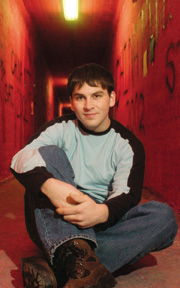 Ethan
Craig Ethan
Craig
Hometown: Hershey, Pennsylvania
Major: Brain and cognitive sciences, and religion
Clusters: Undecided
Career plans: A Ph.D. and a college teaching post
First semester: "I was surprised that a couple of my
courses were a little easier than I expected. For a new student, that
was kind of a treat. But this semester has come back with a vengeance."
One day, Superman flew up to the drive- through window of a McDonald's
and ordered a Quarter Pounder with cheese. He reached into his Spandex,
pulled out his wallet, paid his bill, and flew off. A few minutes later,
Spiderman swung in and ordered a Big Mac. He, too, paid the bill, and
swung off munching on his sandwich.
Finally, an apparently normal teenager walked up slowly, tripped over
his shoelaces, and fell flat on his face. Carefully standing up and looking
around to see if anyone had noticed, he walked the rest of the way to
the window to place his order. The cashier was baffled. Who was this boy?
After all, the last two customers were famous crime-fighters; it was only
reasonable in her mind that the third customer follow suit. But this boy
was so average looking. Who could he be? Some new superhero she had never
heard of? A teenage celebrity? A Backstreet Boy? Unlikely. He was too
scrawny to be a superhero, and far too plain to be a celebrity of any
kind. She was going to have to find out for herself.
"Wow," said the cashier as the boy approached the window. "Did
you just see those guys? It's not every day Superman and Spiderman stop
by McDonald's."
"Yeah," said the boy.
"So, do you know anything about them?"
"Sure," responded the boy. "Superman, Man of Steel, and
Spiderman, the web-slinging guy, right?"
"I guess. So what's your name?"
"Ethan," he answered.
"Good to meet you. Are you friends with those two?"
"Nope, never met them."
"Oh. Well, you came right after them so there must be something
special about you. What makes you different from the others?"
It was Ethan's turn to look baffled. What a strange question this was.
What did make him special? Everyone must be special in some way, but what
made him different? He was good at school, but, then again, so were a
lot of other people. He had high test scores, but so did 10 to 15 percent
of the population of the United States. He held leadership positions in
school organizations and was involved actively with the community. But
none of these truly distinguished him. Test scores, grades, leadership-all
seemed superficial, only skimming the surface of who Ethan was. So what
made him special?
A few possible replies flashed through his mind. Ethan thought deeply
about everything from the nature of the world to schoolwork, from the
most philosophical, abstract ideas down to the most concrete ones. He
could make others laugh, and considered himself a compassionate, caring,
and tolerant person. As a child, Ethan learned to appreciate many cultures
and lifestyles, and had lived all around the United States. He was also
probably one of a very few people who could claim to be both baptized
and bar mitzvahed. But what made him stand out against Superman and Spiderman?
Suddenly, the answer came to him.
"I," he finally responded. "Want to order some Chicken
Nuggets."
|
|
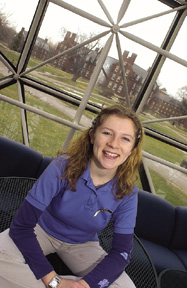 Rachel
Morgan-Wall Rachel
Morgan-Wall
Hometown: Horsham, Pennsylvania
Major: Undecided
Clusters: Astronomy for natural sciences; undecided for humanities
and social sciences
Career plans: After attending graduate school in education, become
a fourth-grade teacher
First semester: "It's OK to be dorky. It's great to be
here with people who are like me. But we don't have to be the same, and
we don't force each other to be the same."
I kept swimming.
When I tried out for varsity swimming during my freshman year, I had
no experience with the sport other than flailing my arms for fun in my
aunt's pool. I tried out because I believed that I was one of the best
arm-flailers around. What inspired me to try out was the fact that I was
always the last one in the pool, even after dark. I just kept swimming.
At tryouts I soon learned that I was in way over my head. All the other
girls had lots of experience, either with a summer team or the local aquatic
club. I tried out anyway, clocking a 1:55 in the 100-meter freestyle which
was, unfortunately, 25 seconds slower than I needed to make the cut. During
the second time trial, I received a 1:43, which greatly disappointed me
for I still had not made the cut. I was sure that I had not made it and
left it up for the coach to decide my fate. The coach, Kip Emig, took
notice of my dramatic drop in time although I didn't for I was still trying
to hold back tears. But there was still practice. So I kept swimming.
Kip said that I made the team, which surprised not only me but my fellow
teammates as well. . . . I kept swimming, even though I was always trailing
during practice, constantly being passed by the other girls. . . . I kept
swimming, partly to prove to the other girls that I would not give up,
but mostly to prove to myself that I could do it. Corny, but true-this
was the only motivation I had to keep swimming.
Kip encouraged me the whole way. In the beginning it was really hard,
but slowly I became a much better swimmer. By the end of my freshman year
I received the "Most Improved" award for dropping so much time.
When I developed acute asthma in 10th grade, Kip just smiled and helped
me through it. When it worsened in 11th, he was always there for me.
Although I was not the fastest swimmer, nor the strongest, I always put
my heart into the sport.
When I made the team, there were seven classmates on the squad. There
were only four seniors left. I endured because I learned to love the sport,
thanks to a great coach who gave an inexperienced kid a shot. Trying out
for the swim team may not have been the biggest risk I have ever taken
but it's the one that has affected my life the most. I learned not only
to swim, but to believe in myself and my dreams. To quote our team motto,
"If life pees in the pool of dreams, add chlorine and keep swimming."
And I'll keep swimming.
|
|
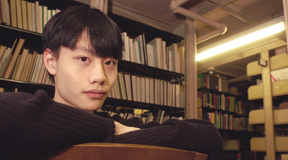
Kelly Chen
Hometown: Kenmore, Washington
Major: A double major in biology and music
Clusters: Biology for natural sciences; music for humanities;
undecided in social sciences
Career plans: Physician
First semester: "I like the freedom in terms of choosing
classes and in terms of time. You get to do what you want to do."
"I don't think you should be a doctor," Grandpa said. "You're
not smart enough."
I was utterly motionless. We were in Europe, my grandfather and I seated
next to each other on a train going 150 miles per hour-the strain and
the speed inducing the train to tremble-and I was rigid. Did I hear
right?
"Not smart enough . . ."
"No. All that complicated thinking would just confuse you. You
should be a farmer instead-simple concepts like 'apples' and 'pears'
wouldn't torture your mind. You could make a lot of money, too. I could
start you up with acres upon acres of farmland; you'd be making money
on literally tons of fruit."
The train was threatening to burst. I lay immobile. Not smart enough!?
Why would Grandpa do such a thing? Did he intend to hurt me? I thought
about it. Considering my grandfather, that wasn't a bad guess. . . .
"No pain, no gain," said Grandpa, and he meant it. . . .
I wasn't going to let him know that he had hurt me, indeed. . . .
I wanted to be a doctor. I wanted to help people and give them hope
and make them happy, something worth much more to me than money. My
grandfather didn't see compassion in me, or my love of music, or anything
else about me, I realized. What did my grandfather know about my level
of intelligence? What did Grandpa know about me, anyway? . . .
Confucius said, "Seek not to be recognized for your abilities,
instead seek to be worthy of recognition." I began to take that
philosophy to heart. Grades, then, began to concern me less and less,
as simply the opinions of the teachers. Because truly, it was impossible
for anyone to know all of me, every single unpredictable part of me.
What other people thought of me, whatever insults or compliments they
chose to give me, would never again have the power that they used to.
I would know when I deserved praise or criticism. I would do what I
believed to be right.
Grandpa finished telling me what he thought I should do with my life.
He asked if I understood. I almost laughed. My dear Grandpa. I felt
as if I could fly. I was free and I was myself, and Grandpa's words
no longer constrained me. I was going to be a doctor, no matter what
Grandpa said. I understood that. So I said yes. The train shook and
shrieked, but I ignored it.
|
|
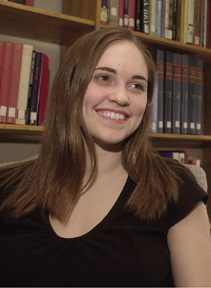 Genevieve
Markey Genevieve
Markey
Hometown: Washington, D.C.
Major: English
Clusters: Undecided
Career plans: Law
First semester: "I can go the library for hours because
I enjoy what I'm reading and the classes that I'm taking. My friends sometimes
look at me a little funny when I tell them that I just enjoyed spending
five hours at the library. I also joined the crew team, and that's been
important to me because the team is like a built-in family."
I met my first poem at age six. During an afternoon snack
of apple juice and graham crackers my first-grade teacher, Ms. Phillips,
read my class an Emily Dickinson poem:
A slash of Blue-
sweep of Gray-
Some scarlet patches on the way,
Compose an Evening Sky-
A little purple-slipped between-
Some Ruby Trousers hurried on-
A Wave of Gold-
A Bank of Day-
This just makes out the Morning Sky.
I had seen sunrises and sunsets without the words to describe
them. Beauty is difficult to verbally encode, but somehow this Emily lady
had done it. She transformed a complex, bizarre, thrilling "thing"
into a tangible, distinctive "something." When my teacher read
the line, "Some Ruby Trousers hurried on-" I giggled as I imagined
the horizon pulling on a pair of ruby pants as fast as it could, and running
away. With Emily's accessible, vivid image, I was introduced to the power
of the word. . . .
Ten years later, an avid lover of poetry, I was thrilled
when asked to join an exclusive poetry course taught at the Folger Shakespeare
Library of Washington. Twelve girls from Maryland, Virginia, and D.C.
became the "Shakespeare Sisters.". . .
We had been concurrently writing poetry, and at our last
session, we were to share our poetry with each other. I had a stash
of poems I was prepared to read. I had no reason to fear sharing my poetry.
A bunch of girls sitting around a table seemed harmless enough. . . .
As the other girls began to stand up and recite their masterpieces, the
poetry sharing became a whole new ballgame. Annie, a tall, freckled girl,
stood up, adjusted her long locks over her shoulder and began to read.
Her four-page poem consisted entirely of a Latin translation of astrophysics
vocabulary in a triameter rhythm. I could feel my mouth get dry, cheeks
begin to blush, and my eyes wander toward the doorway, any means of escape.
By comparison, my poem seemed insignificant. It was 10 lines,
in English, with no established meter. It lamely began: "You are
my boyfriend, I love you lots. You are my X. I love you not." What
was I thinking? Annie-like Alice-began to seem taller and taller, and
I felt smaller and smaller. The rabbit hole would not be a bad place to
find at this point. I could imagine the eyes of Shakespeare's portrait
rolling back into his head. This Shakespeare Sister was unqualified.
At my turn, I rose to my feet, took a deep breath and began.
As it turned out my teenage heartbreak angle resonated with the group
and was not the only poem on the subject. We laughed knowing exactly how
each other felt.
It was absolutely terrifying to share a part of myself.
It is one thing to read or hear poetry of others, but to share my own
is risky. Opening myself to criticism and judgment is never easy, but
clearly it is a risk worth taking. Surviving the scrutiny, and coming
out on top, a more assured individual, a few steps closer to finding my
own voice, I felt triumphant.
Choking Fear
Hovering Doubt
Tightness in the Throat; Silence all around
A chance to Fail, A way to Grow,
I raise my voice to call out-
The simple question, "Who?"
Funny the someone who answered back-
Myself Replying
YOU
|
|
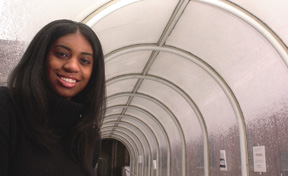
Krystle Dixon
Hometown: Westfield, New Jersey
Major: Biology
Clusters: Undecided
Career plans: Pediatrician
First semester: "I've met a very diverse group of people-not
just in terms of race, but in terms of their morals and personalities
and outlooks-and that's great."
It was around twelve. The sun was exposed by the barren skies, and
the heat created a rather thick atmospheric air. The humidity was almost
unbearable. It was 96 degrees, and the thought of air conditioning was
considered an unattainable luxury for a house that was built over a
century ago.
I walked out onto the porch where the breeze was most apparent and
in one glance it seemed as if this porch was a window to the entire
world. All I could see were miles and miles of neverending verdant pastures:
untouched, pure, clean land. And in the center of it was my grandfather's
home.
The postcardesque image that people tended to associate Jamaica with
is usually the immaculate waterfalls and the palm trees. But here in
Four Paths, Jamaica, life did not depict that paradise image. It did
reveal, however, a greater appreciation for the simplistic things in
life. As I stood on the porch I appreciated those things for this view
was a rather drastic contrast from the backyard of my home in suburban
New Jersey.
I felt a hand on my shoulder, and in a glance I realized it was my
mother. . . . "Nice day, isn't it," she said with a smile.
She wiped the sweat from my nose and continued to walk into the front
yard.
I just laughed because I did not understand how anyone could enjoy
this heat. I guess that was something only Jamaicans understood. Although
I proudly call myself a Jamaican American, I always did perceive a sense
of detachment from Jamaican culture. My mother was born and raised here,
and I was born and raised somewhere else. I guess the accurate description
for this feeling that I felt was "culturally bereft." . .
.
I decided I needed to go someplace to relax and think so I ventured
off to the main parlor. I sat down on the crimson colored couch with
velvety pillows and looked around. Instantly, I marveled at how rich
in history this house was. Everywhere you looked, you could not help
but be immersed in photographs and belongings of the past. I saw my
youthful grandfather standing with optimism in his eyes. I saw my mother,
barely 9 years old, playfully smiling. Then I saw myself, a baby in
the loving arms of my grandmother.
I suddenly remembered all the little stories that I have been told
and how those stories were as much a part of my life as they were theirs.
Immediately, I did not feel so culturally empty. It did not matter that
I was not born in Jamaica because all its culture was being handed down
to me. Just by being my mother's daughter, Jamaica was a part of my
identity. And for the fist time, I could honestly believe that I was
a Jamaican American.
|
Maintained by University Public Relations
Please send your comments and suggestions to:
Rochester Review.
|
 |
![[NEWS AND FACTS BANNER]](/URClipArt/news/titleNewsFactswide.jpg)
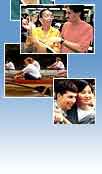

 Ethan
Craig
Ethan
Craig Rachel
Morgan-Wall
Rachel
Morgan-Wall
 Genevieve
Markey
Genevieve
Markey